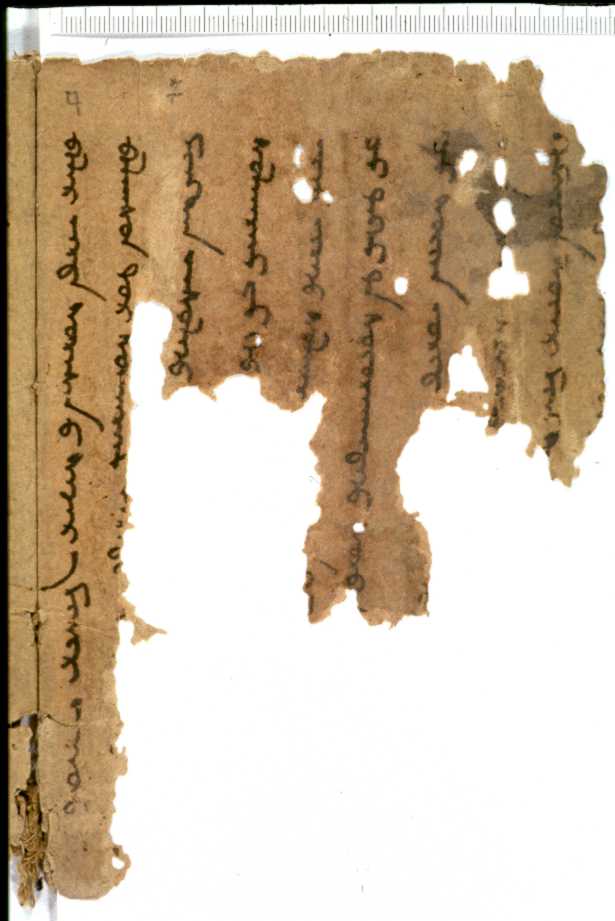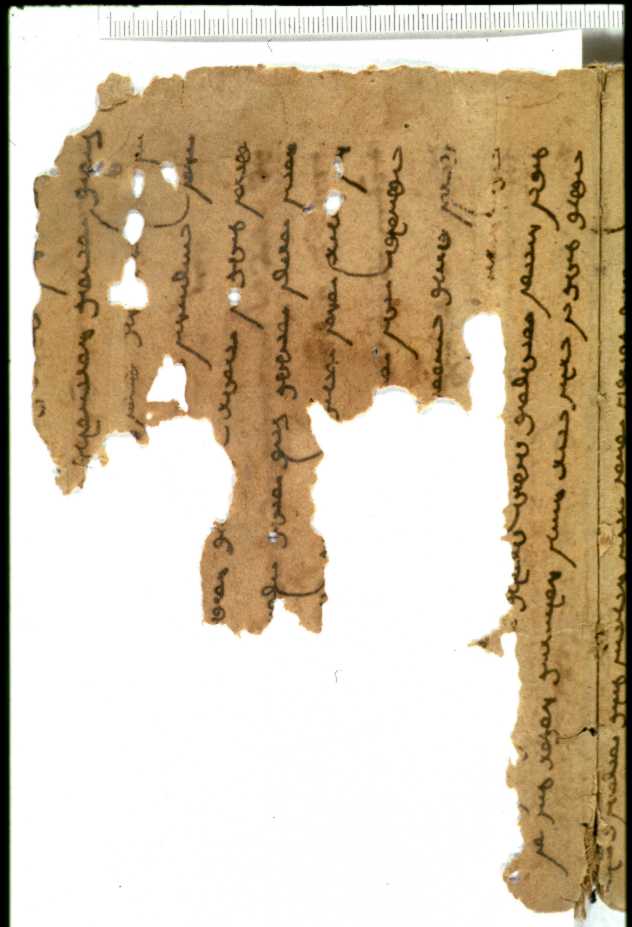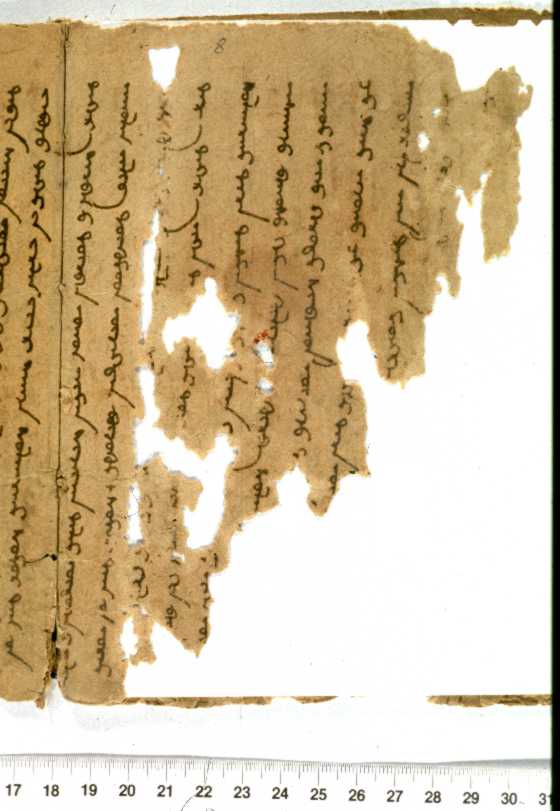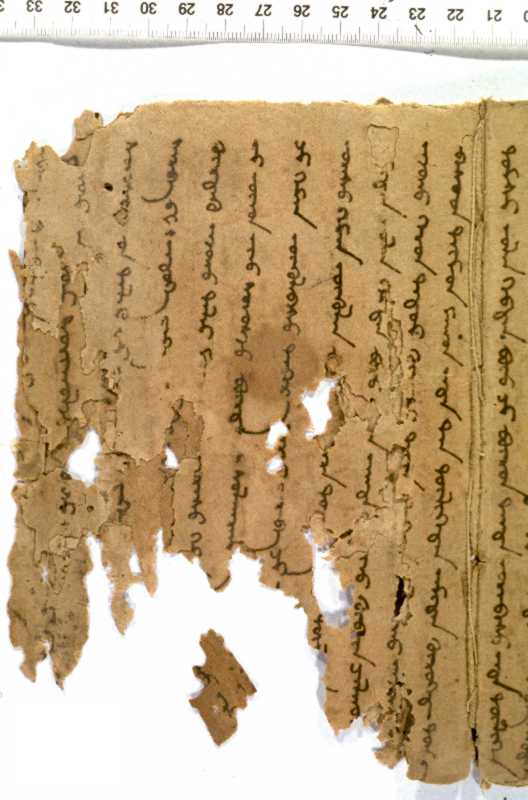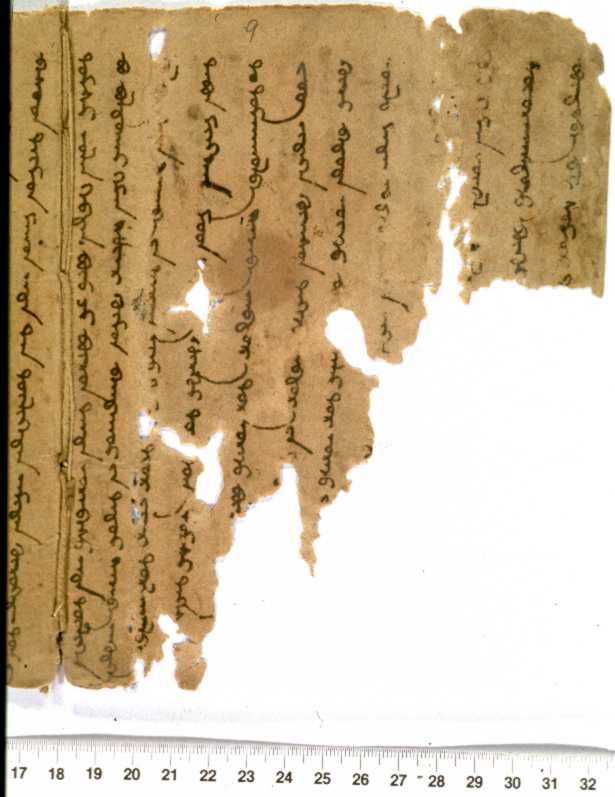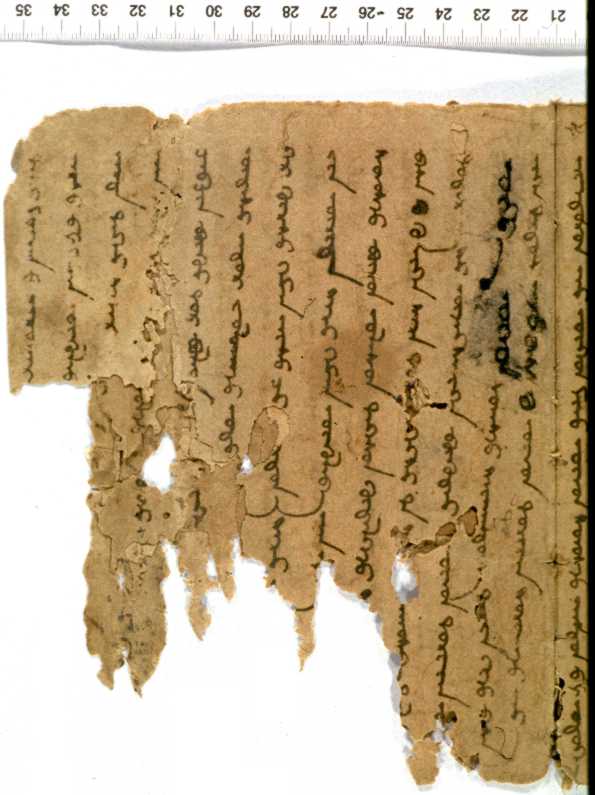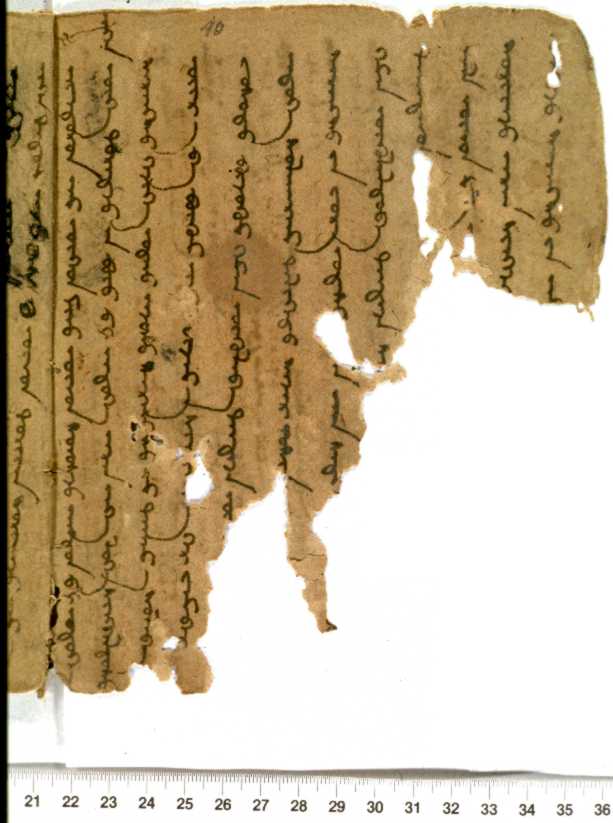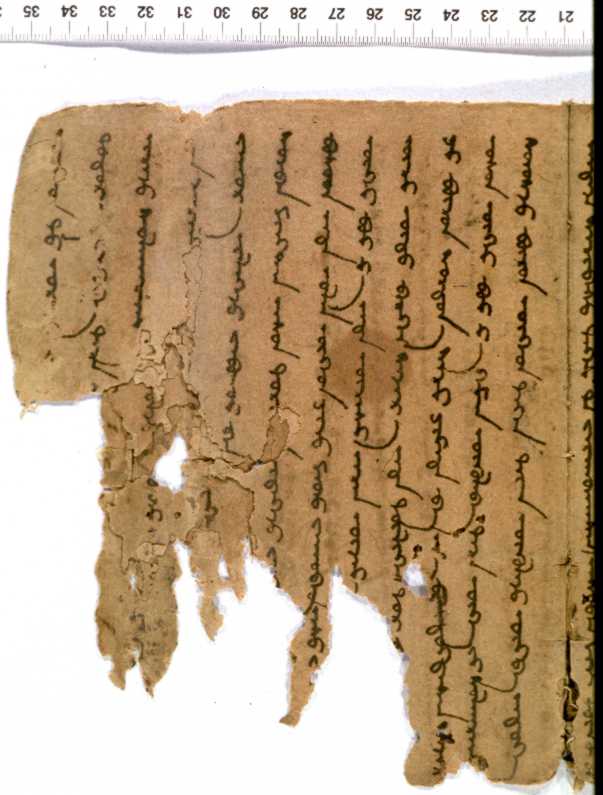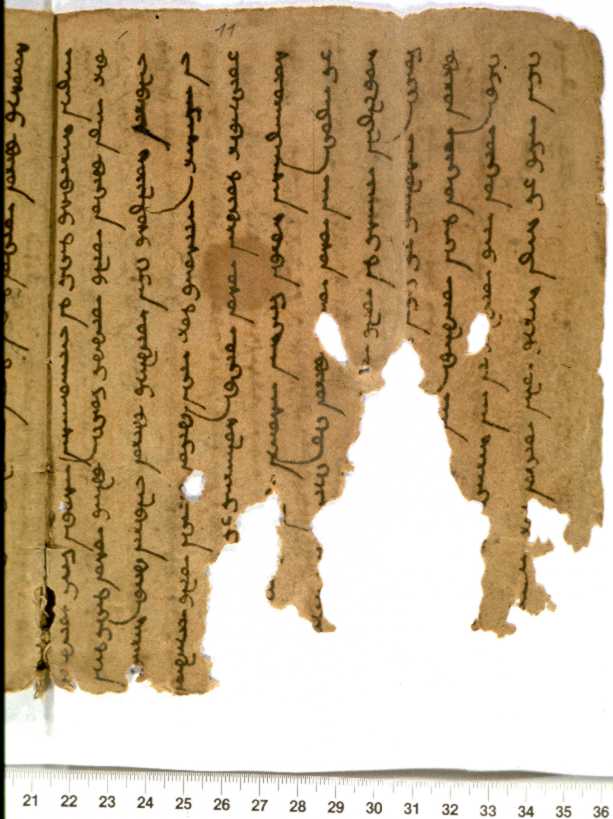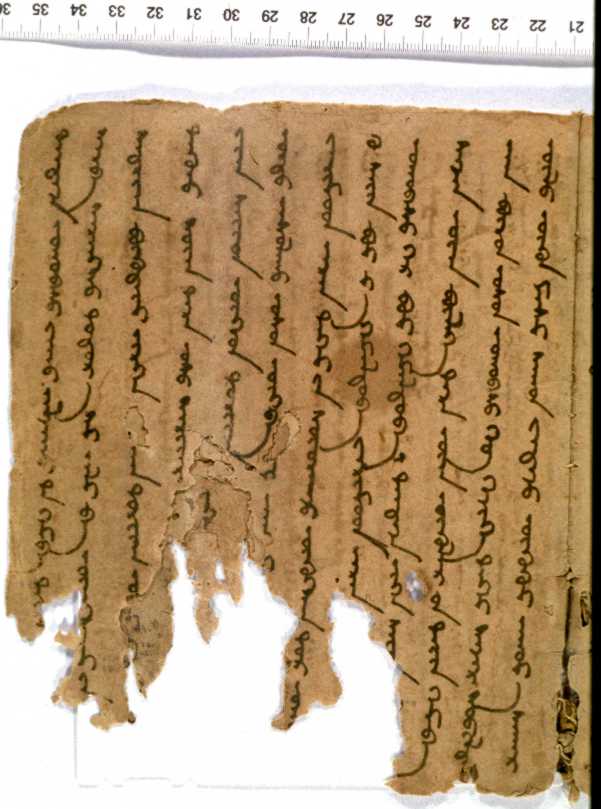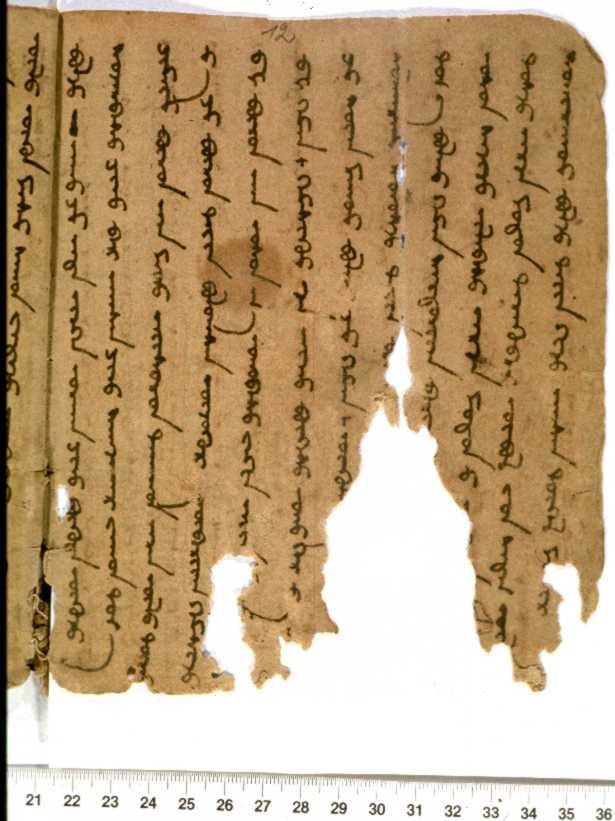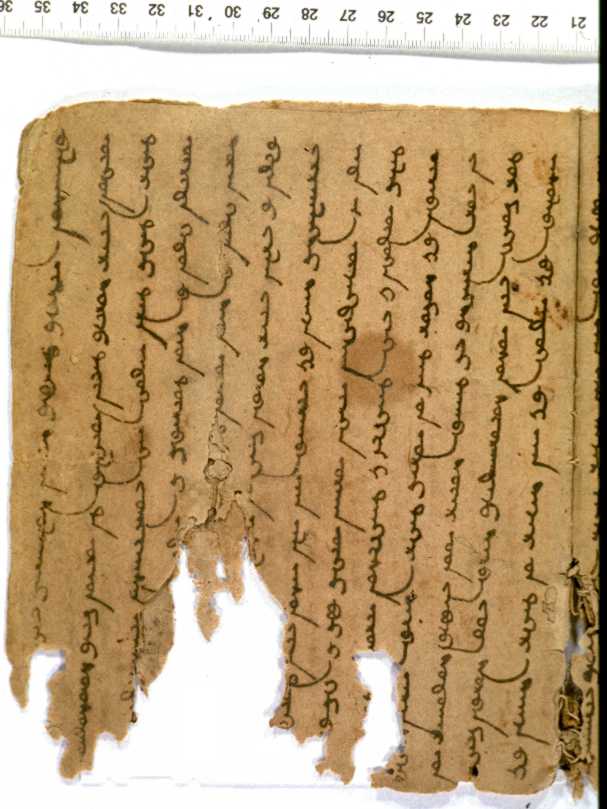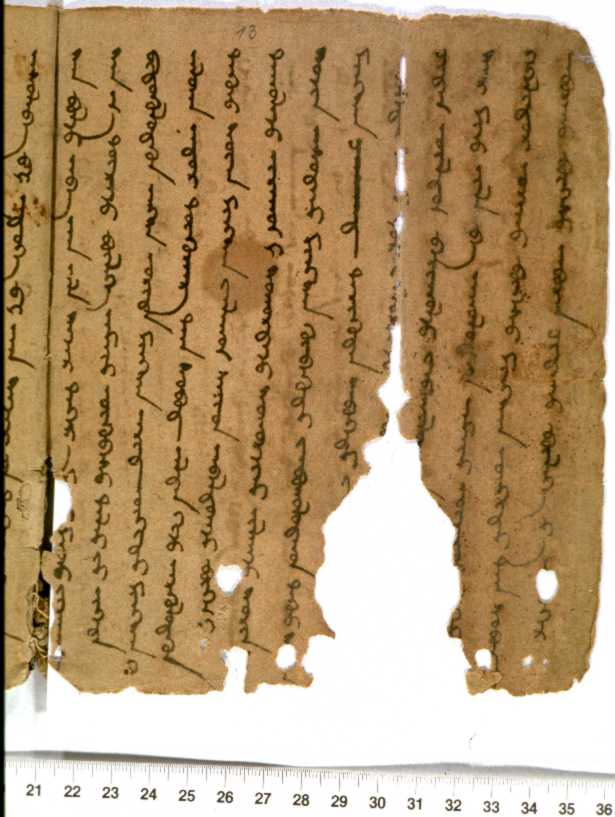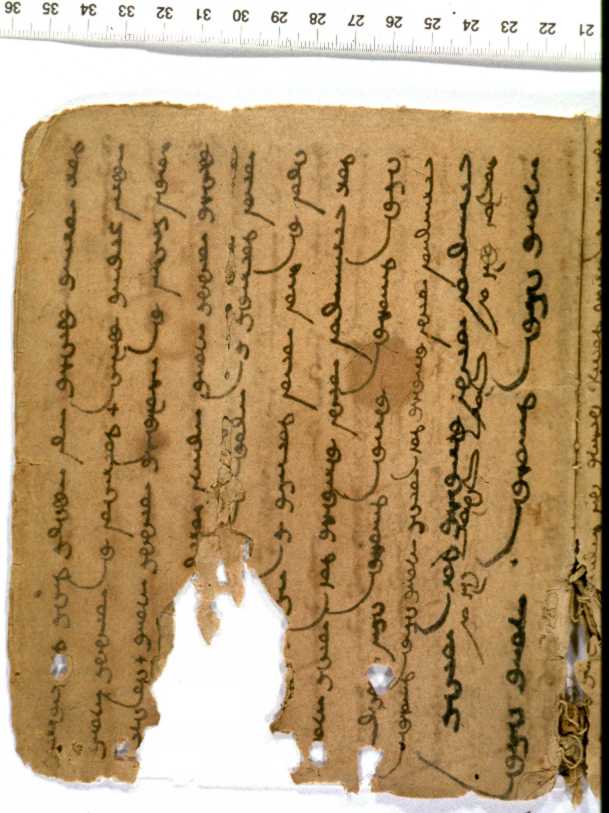Транслитерация монгольского текста приводится на основе публикации Д. Төмөртогоо (D. Tumurtogoo "Monuments in Uighur-Mongolian Script (XIII-XVI centuries) Introduction, Transcription and Bibliography, Academia Sinica, Institute of Linguistics / D. Tumurtogoo, G. Cecegdari. Taipei, Taiwan, 2006")
7a1. Balar erte Qurasan-u γajar-a Misir neretü 7a2. balγasun-dur Sulqarnai neretü [nigen kümü:n] 7a3. mingγan nasulaju [......]
7a4. Sulqarnai-yi keb[......] 7a5. inu irejü Sulqar[nai......]
7a6. či tngri-de soyurqaγdaju γurb[a]n [. ..] bö[ge:sü . . .]
7a7. či qoyi:na urid[a......] 7a8. e[n]e [ü]ge-[yi] sonosču [.. .] 7a9. keme:rün qoyar mingγ[an nasulaju . . .]
7a10. [.....................] 7b1. [.....................]
7b2. metü noyadi quriγu:lju [. . .] 7b3. ene [üg]e-y[i sono]sču [. . .]
7b4. Nasun-a yaγdaγsan [.. .] 7b5. bürün. Tngri-[d]e irüge:r-e [. . .]ju γurban min[gγan nasulaju . . .]
7b6. qoina urida üküküi minü ügei atuγ[ai . ..]
7b7 san [γ]ajar usun üjeb[e .........]
7b8. yabuγu:lba.
Nigen nö[ker . ..] 7b9. kürün baraju yaγu:d [. . .] 7b 10. yekeγajar [. . .] 7b11. tabin sayi:d nökedtü kegü:rge getü:ljü [. ..] 7b12. yabuju tngri-i:n jrlγ-iya:r γaγča Sulqarnai Sümür taγ-un 8a1. dege:r-e γarba:su dörben nuγus naiman qijaya:ra dalai ötögen-ü ali[ba]
8a2. aγu:las aliba tökümü:d üjegden büjügü:i.
Sümür taγ-un orai-8a3. dur kü[rtele . . .]elg[ü . . .] Sul[qarnai . ..]
8a4. ter-e dege:r-e nigen ta[sman del]ekei-dür [. . .] kin[. . .]
8a5. Sulqarnai tere tasman-i [. . .] nigen nö[ker-e:če] 8a6. asaγču baγu:su keme:n külij[ü b]e kürbe
Sulq[arnai. . .] 8a7. aqui-i inu garudi šibaγu:n üjejü [.........]
8a8. či qani ajuγu:.
Či dege:r[e tn]gri-deče öt[ögen . . .] 8a9. öndür-e:če ene tasman möngke [. . .]
8a10. [..................]
8a11. [..................]
8a12. [..................]
8b1. [..................]
8b2. aba[. . .] könggelen [......]
8b3. [. . . m]etü [. . .]
8b4. sonosu[γa:]d dalai-yi [......] 8b5. γarba.
Bi edüge: yeke [......] 8b6. kürtekü ajuγu:.
Dalai mör[e]n-[dür] orasu kem[e:]n [üge-]8b7. yi noyad inu sonosču bürün.
Sulqarnai-a [. . .] 8b8. či keme:n ögülebe:sü dege:r-e γarču irebe či [.. .]
8b9. orasu keme:n ögülen b[ürün.
T]ere do[tur]-a [ada] tül[ige]n [. . .] 8b10. [a]mitan olan ge[m]ten büyü.
[En]e aγta-[yi č]inu gübčin čalγu[qu] 8b11. ajuγu:.
Gerün tedüi gürisi teyi:n böge:d [ča]l[γu]qu aj[uγu:]
8b12. Basud teimün maγu:n ada-tan tüligeten amitan görüge:d toγ-a: 9a1. tomši olan kebten büyü.
Či bürün tende oraba:su ada tüligen 9a2. bü boltuγai keme:n qoyar kümü:n baγtaqui-i:n tedüi qaraba egü:dke-9a3. gü:l[b]e.
Ene qaraba-i:n γadana inu t[e]m[ür] tour-iya:r torlaγu:lba.
9a4. Tabun mingγan mod d[aγu:stal]a kürküi toγ-a: tomši dege:s[ün] 9a5. tomγaγu:lba.
Qaraba abdur-a-dur oraju bür[ün . . .]
9a6. jöb idege:n künesün tege:jü abdur-a-i:n d[o]t[ura . ..]
9a7. güri batuda uyaju bü[rün. D]alai-dur oraju y[abuba . . .]
9a8. ülü mede[n] odču [bürü]n.
Nigen [. . .]
9a9. [. . .]
9a10. [. . .] keme:n ögüle[jü] S[u]l[qarnai. . . tngri-de] 9a11. soyurqaγdaju büküi [. . .] 9a12. bütübe.
Bi Sumur-t[aγ . . .] 9b1. Dalai mören-ü iruγa:r-[tur . . .] 9b2. aisu bi keme:n ögüleb[e. . ..]
9b3. erte tngri γajar [. . .] 9b4. ene elči [. . .] 9b5. čabčin büküi-dür bolad [. . .] 9b6. üdeši nadur joluγaju odb[a. . . .]
9b7. ker kürsü keme:n aisu
či [qu]rdun-a qari [aisuqu-]9b8. yi:n urida qari keme:n ögülebe.
Ene ü[g]e-[yi Sulqarnai] 9b9. sonosču bürün.
Olasun dege:sün ködelgejü [. . .] 9b10. basa kü nigen sara-dur [de]ge:gši-de γ[arču d]aγu:sba.
Dal[ai-i:n] 9b11. dotur-a-qi üjegsenige:n bügüdei noyad-turiya:n ö[gülejü] 9b12. ögbe.
Noyad sonasču γaiqalduba.
Teyi:n ki:jü basa 9b13. nigen tedüi aju.
Basa kü noyad-turiya:n quriya:ju ey-e 10a1. eyetürün.
Ai nöked minü noyad sonosču aγtun.
Bi edüge: 10a2. nigen üge duradču an buyu.
Bi edüge: naran eke-lüge: šinggeldüsü.
10a3. Qarangγu kejige: odqu ajuγu:.
Qarangγu-yi daγay-a. Qolaba
10a4. oyi:r-a ba büküi inü üjey-e.
Šin[g]ge[le]ng ker yambar 10a5. yosutu büjügü:i keme:n ögülebe.
Tendeče nö[ked . . .]
10a6. edüge: Sulqarnai delige:tü γajar usun [.........] 10a7. qarangγu-i:n jüg odsu [kem]e:n ene sedk[il. . .] 10a8. keme:n ögüleldübe.
Tendeče Su[lqarnai. . .]
10a9. daγadqun [.....................]
10a10. ol[a]n noyad j-a [. . .]
10a11. quriya:ju naran šinggeg[sen .. .]
10a12. baγu:ju qarangγu-i:n am[asar-a . . .]
10b1. nöked-tü or[aj]u [......] 10b2. dotur-a yabuba.
Tere [. . .] 10b3. irejü Sulqarnai [. . .]
10b4. ene qarang[γu . . .]
10b5. jaγu:r-a ilege:jü yabuqui-ba:n [. . .]
10b6. γurban mingγan nasun-duri[ya:]n itegejü y[abuba . . .]
10b7. busud ede olan nöked činü metü yaγu:ba nasu-i:[n üres] 10b8. ügei büi j-e.
Ede üresi aran üjey-e. [.. .]
10b9. öri ütü berkes γajar-a ada tüligen-dür b[olba. . . .]
10b10. či bürün qurdun-a qari.
Čimada ba es-e bitügdesen γajar 10b11. usun ügei büi j-e keme:n ögülebe.
Tere üge-yi Sulqarna[i] 10b12. sonosču bürün nöked-tege:n tein ögülejü ögbe.
Edüge: 11a1. endeče qariba:su tngri-de jaya:γdaγsan nasuba:n minu tögüs[be:sü] 11a2. ber ende böge:d ülü üküküi möngke bolqu usun tngri-deče 11a3. jalbarin γuyi:ldusu keme:n ögülejü bürün jalbarin kürbe.
Qarang[γu]-11a4. i:n amasar-a ayi:suqu-dur nigen kümü:n beyege:n ülü üjegü:lün 11a5. čögečebe:r dügü:ren usun ögbe.
Sulqarnai či [... tngri-de] 11a6. soyurqaγdaγsan γurban mingγan nasuna:ča [. . .]
11a7. či edüge: ene usun uγ[u:ju] bürün.
Keb kejig[e: t]n[gri] γaja[r . . .] 11a8. qubiltala inaγši-da ülü ü[kün . . .] 11a9. möngke nasulaqu či keme:n [ögülebe.
Tere üge-yi Sulqarnai sonosču] 11a10. bürün nöked-tege:n ögülebe.
Ene [. ..] 11a11. kem/e:/be.
Nöked inü ögüler-ün ene qarangγ[u . . .] 11a12. keme:n amu.
Či γada: γarču olan nöked-tür [. . .]
11b1. tendeče uγu:ba:su yaγu: aljaqu ta kem/e:/be.
Teyi:n [ki:jü . . .] 11b2. γarba.
Qarangγu dotur-a-qi ali ba üjegsen-i:n [. . .]
11b3. satayan bügüdeyi irgen [or]γan-duriya:n ö[gü:lejü ögbe.]
11b4. Tegü:nü qoina tere usu γariya:r [............]
11b5. iya:n sayi:d nöked-türiye:n [. . .]
11b6. urtu nasulaqu usun ögbe.
Bi enekü [. . .] 11b7. jarimu:d aran tngri-i:n soyurqaju ögügsen-düruγu:[ba:su] 11b8. kü sayi:n bui j-a keme:ldübe.
jarimu:d aran [. . .] 11b9. uγu:ba:su ker büi keme:ldübe.
Tendeče nigen sayi:n [ebügen] 11b10. sečen noyan bülege:.
Tere noyan ögüler-ün teyi:n kem/e:/be.
11b11. Ene bürün usun uγu:ba:su keb kejige: tngri γajar qubiltala 11b12. ülü ükün maši saγu:n yadaju üküküi aqui-a saγar 12a1. bolju aqu či.
Ede irgen orγan činu bügüde üküjü 12a2. qočarba:su činu ber aγsan činu γaγčaγa:r yaγu:n tus-a.
12a3. Čimayi bürün ene metü ayi:surun daγaqun aran ülü törei 12a4. j-e.
Či bürün teyi:n boluγsan üjügü:r öbe:riye:n gemšijü 12a5. bi bürün.
Ene usun es-e uγu:ba:su ya:kin eyi:n [. . .]
12a6. bi keme:n gemšiküi-e:če [ülü] aiqu böge:sü uγu:.
Kerbe[. ..] 12a7. či qoina maγu:i bolqu či keme:n ögüle[be. . . .]
12a8. Sulqarnai sonosču teyi:n bö[ge:sü . . . yaγu:n] 12a9. tus-a bolqu keme:n γarturiya:n bari[ju . . .]
12al0. usun sačiju ilebe:sü arča modun-u n[abči]n [. . .] 12a 11. tusču arča modun tereküber öbül jun qatan ül[ü] 12a12. qoqiraqui bolju teyi:n ki:jü aγsan tügel Mi[s]ir 12b1. balγasun-a irejü tegü:nü qoina Sulqarnai yek[e . . .] 12b2. nöked-iye:r quriju teyi:n ögülebe.
Ta noyad minu sonosudqu[n]
12b3. dege:r-e tngri-deče etüge eke joqiya:γsan inaγšida [. . .] 12b4. urida kedün ba qad törebei j-e.
Edü[g]e: [. . .] 12b5. qoina kedün ba qad noyad t[öremü] j-[e. . . .]
12b6. bidan-u Jrlγ-iya:r γurban mingγan nasul[aqu . . .] 12b7. jirγalangγi γaγča bi jirγaba.
Ene ele nasun-iya:n tögü[sbe:sü] 12b8. nada es-e üjegdegsen irgen orγan ügei büi j-e kem/e:/be.
12b9. Dalai ötögen-i yeke tenggis-i tenggisün iruγ[a:r-i] tu[γu:lju] 12b10. irebe bi.
Sumur taγ-un orai dege:r-e γarba.
Naran š[ing]gekü-12b11. i:n jüg qarangγu-yi daγaba.
Qoyar od yabuju γutuγa:r on-12b12. dur möngke-yi:n usun soyurqaγdaju γarba.
Jöb γurban ming[γan] 12b13. nasulaba bi.
Edüge: bi ene γajar-un dege:r-e γaγča bi
13a1. qan bolju aba.
Ene ele γajar dege:r-e m[in]u metü jirγaγsan 13a2. qan es-e törejü bülege:.
Namayi ükübe:sü dalai-yj nigete 13a3. bitügü:lüdkün.
Angqa urida mingγan nari:d ökidi mingγan kü 13a4. altan abdur dügü:reng tana, subud, altan ki:jü ergü:lüdkün.
13a5. Tegü:nü qoina mingγan jalaγu:s sayi:d abalduγči bökes-i 13a6. daγu:laju iraγu:s-i quγu:rdaju quγu:rčini ilγaju qorin 13a7. γučin nasutani mingγan köbegü:di yabuγu:ludqun.
Tegü:nü q[oin]a 13a8. mingγan čaγaγa:d terigü:ten ebügedi ya[buγu:ludqun . . .]
13a9. [e]büged t[ngr]i-dür jalbariju y[abutuγai...]
13a10. jidas üldüs bariγu:lju yabuγu:lu[dqu]n [...]
13a11. γar minu ile ba aγu:ludqun.
Namayi üje [...] 13a12. kege:lidür oraqu böge:sü mingγan ökidi tana subud 13a13. aburaqu böge:sü aburan čidaqu bülege: j-e.
T[ed]ege:r [kege:li-] 13b1. dür oraqu böge:sü ede ebügedi tngri-dü[r] Ja[l]bariju 13b2. aburan čidaqu bülege:.
Törege:d ba üküküi ajuγu:.
13b3. γurban mingγan ba nasulaba:su üküküi ajuγu:.
Keb keji[ye:] 13b4. böge:sü üküküi ajuγu:.
Edene:če urid[aju . . . qad] 13b5. noyad törebei j-e.
Edüge: ba [......] 13b6. kedün ba qad noyad töremü j-e.
Ai [...] 13b7. tur jirγaγtun.
Ükün baraba:su tus-a ügei ajuγ[u:] 13b8. kem/e:/be daγu:sba baraba daγu:sba keme:n e[b]üged 13b9. jirγadqun
ükün baraba:su tus-a ügei ajuγu: kem/e:/be daγu:sba.
13b10. Jirγadqun ükün baraba:su tus-a ügei 13b11. qudluγ bols-un edlüg edgülüg kels-ün 13b12. ajuγu: kem/e:/be daγu:sba ajuγu: kem/e:/be.
Перевод
[7r]
[1] In ancient times,in the land of Qurasan,
[2] in the city named Misir, [...] named Sulqarnai.
[3] Living [...] thousand years [...],
[4] [. .? . .] Sulqarnai,
[5] his [...] coming, Sulqar[nai] [...],
[6] Thou being favored by Heaven, [...?...] [...]
[7] thou, [either] after [or] before, [...]
[8] [When Sulqarnai was] listening to this word, [...],
[9] when he said, [...] "[Living] two thousand [years] [...]"
[10] [...]
[7v]
[1]
[. . .],
[2] causing the noyad like
[. . to assemble,
[. ..],~
[3] "When
[I] was listening to this word
[*
[4] being impoverished in years
[ . ],
[5] when
[.. .] was
[I I]
[. ? ]ingin a prayer to 4' Heaven,
[living] three
[thousand years]
[. .],
[6] let my dying
[either] after s
[or]
before be nonexistent,"
[. .],
[7] he saw land and water 5
which
[ *].
[8] He caused
[ . .to go.
[. .] one nm3
[ker6]
[. .
[9] after arriving,what
[ . ].
[10] great land 65
. .],
[11] crossing a bridge with fifty good noked
[. . .],70
[12] going, by the Decree of Heaven,as only Sulqarnai
[8r]
[1] ascended upon Mount Sumur,in the four corners and
[in]
the eight directions,
[2] the mountains, whatever
[they were],77
and the hollows, whatever
[they were], of the vast earth were 80
seen.
[3] Unto the peak of Mount Sumur,
[ . ],Sul
[qarnai] 84
[. ],
[4] on that,one strap making
[ ] to earth 90
*
.],
[5] Sulqarnai
[ . .] that strap
[. . .],saying
[unto
himself], "I shall descend,
[6] inquiring
[of] one
[of my]
n
[ker]," he tied
[it to himself] and arrived.
[7] The garudi
bird,seeing that Sulq
[arnai] was 1
[0". .],1Oso
[said].
[8]
"Thou art foolish,thou.From Heaven above
[ ]106
(?)earth,
[9] from the height
[. .] "this strap
[* . ]110
everlasting
[. . .],
[10]
[. . *],
[11]
[. . .],
[12]
[* . ],114
AN EARLY MONGOLIAN VERSION OF THE ALEXANDER ROMANCE 57
[8v]
[1]
[. .
[2] was 11
[-*]
[. .].
[3] "
[. .like
[this].120
[4] having listened to
[ ]
[ .the ocean
[ ? . . ],124
*
.],saying
[to himself], "
[5] I went out. Now the great
[. . .]
[6] is attained. I shall enter
[into] the ocean
sea,"
[7] when his noyad were listening to
[ . ],
[8] as
they spake to Sulqarnai, saying, " Thou
[* .1],, saying, " Thou
art ascended upon
[it] and art (?) come.When
[thou] art 135
speaking, saying
[to thyself] that thou
[9] wouldst enter
[ . ],136
within that,
[in danger] and disaster,
[10] the living beings
are lying"in multitudes."
[11] They will completely 142
swallow this thy gelding.So, then, they will swallow
stones the size of a tent.
[12] Other such bad,150d angerous,
and disastrous living beings and beasts 153
[9r]
[1] are lying there in multitudes incalculable.As for thee,
if
[thou] enter there, let there
[2] not be danger and disaster," 158
[3] he caused
[one] to build a qaraba the size of
[one big
enough] to hold two persons.
[As for] the outside of this qaraba,
he caused
[one] to net
[it] by
[means of]
[. . nets.
[5]
He caused
[one] to twist ropes incalculable which would
attain unto
[the point of] exhausting
[4] five thousand mod.`69
When he was entering into the qaraba box,
[. .]
[6]
loading173f ood and provisions'in sufficient quantity,175w ithin 176
the box,
[. .] when he was tying
[7] a stone firmly, (?)he
went,entering into the ocean.
[. ]
[8] When he was 180
going, not knowing,
[. .] one
[. . .]
[9]
[. . .],
[10] speaking,
saying,
[". . ., S
[u]l
[qarnai]
[ . ]
[11] being
favored
[by Heaven]
[. ]
[12] was achieved, I spake,190
saying,"
[. . Mount Sumur,
[9v]
[1]
[to] the bottom of the ocean sea,
[. . .]
[2] I shall
approach."
[. .] 19' Formerly Heaven and Earth
[ . .],197
FRANCIS WOODMAN CLEAVES
[4] this (?) messenger 1'
[. . .],
[5] at the moment when
[I]
was hewing, steel
[ . ],
[6] in the eveningwent, encountering
me
[. . .] 20b
[7] I shall approach, saying, "How shall I
arrive?."
[8] Return thou swiftly.Before
[ ]
[thou]
spakest, saying, " Return." When
[Sulqarnai] was
[9] listening
to this word,21' causing the hempen rope to move, he went
out.
[. ]
[1o] again, indeed,215in one moon, he finished
ascending upward,That which he had seen
[11] which was
within the sea 219-all 220-he told unto his noyad.
[12] The
nayad, listening,wondered at
[it]. So he did.Again,
[13] there being
[but] a moment,again, indeed, causing
[them]
to assemble,227
[lOr]
[1] when he counseled counsel unto his noyad, he spake, saying,
"Ai, my n6ked, noyad, be listening! J now am recalling
[2] one word. I now shall set with Mother Sun.How far
goeth
[3] the darkness? I shall follow the darkness. I shall
see whether it be far
[4]
[or] whether
[it be] near.238.
[As to] the
setting,how
[is it] and what
[5] rule doth it have? 1' Then
the n4Oked]
[. .] spake unto one another,s aying,
[6] " Now
Sulqarnai,
[. .] the broad land and water, saying
[to
himself], 'I shall go in the direction of
[7] darkness,'
[. . .]
this thought,
[* . .].
[8] Then Su
[lqarnai],
[. . .]
[9]
"Follow
[ye]!
[ .]
[10] the many noyad
[. . ],
[11]
assembling
[. . .],that the sun had set,
[. . .],
[12] going
down,
[. .] unto the entrance of darkness,260
[lOv]
[1] entering with
[his] niked,
[. . .]
[2] went within. That
[. . .],
[3] coming, Sulqamai
[. .],spake, saying,"
[4]
This darkness
[. . .],
[5] between
[. . .],thy sending and
going
[. . *],
[6] went,27t2r usting in thy three thousandy ears.
. .]
[7] These many other noked
[8] do not have whatever
[seeds] of years
[of life] as thee.
[We] shall barely see
these seeds.
[ . ]
[9] have been in jr i
only difficult 282
lands, in danger and disaster.
[ . ]
[10] As for thee, return
AN EARLY MONGOLIAN VERSION OF THE ALEXANDER ROMANCE 59
swiftly. And there is neither land nor
[11] water which hath not
yet been traversed by thee."
[12] When Sulqamai was listening
to that word, he so spake unto his noked. When he was
speaking, saying," Now,
[lir]
[1] when
[we] shall return from hence, praying, we shall together
request
[2] from Heaven the water whereby, even when
[the
number of] my years predestined by Heaven shall be
finished,292
[ I], then, shall not die here and shall become everlasting,"
[3] he arrived, praying. At the moment when he draweth
nigh unto the entrance
[4] of darkness,294o ne person, not showing
his body,
[5] gave a cup full of water
[unto him].
[He
spake,] saying, " Sulqarnai, thou,
[. . .], from the three thousand
years
[6] whereby
[thou] hast been favored
[by Heaven],800
[. . .
[7] when thou now art drinking this water,
[8] up to
the time when Heaven and Earth30'
[ ] are transformed
(= destroyed),0B in the meantime,30n7o t dying,
[. . .
[9] thou
shalt enjoy everlasting life.
[10] When
[Sulqarnai] was
[listening
to that word],309h e spake unto his n6ked.
[11] He said, "This
I . ]. 3"When his noked spake,
[12]
[they spake, saying,] 312
"Thou art saying
[to thyself], 'This darkness
[. .].' "Going
outside,314h e said unto the many noked, 'A!
[* . .] 317
[lIv]
[1] then, if
[ye] drink, how will ye be hindered? '6
So
[he did].319
[92]h e went out.
[He] told unto his people what he
had seen,whatever
[it was], which was within the darkness-
[3]
[. . .] (?) all and everything.
[4] After that,
[* . .] that
water, by the hand,
[. . .]
[5]
[. . ] my
[. . .] unto
my good noked.
[6] I gave the water whereby one liveth long.
This
[, I **1"
[7] Some people said unto one another,
" Jn
[asmuch as] Heaven hath been pleased to give
[it],if
[we]
drink
[it],
[8] indeed, it will be good." Some people said unto
one another,
[9] c
[. . .],if
[we] drink
[it], how will it be?"
Then there was one good
[old man],
[10] a wise noyan. When
FRANCIS WOODMAN CLEAVES
that noyan spake, he so said,
[11] " As for this, if
[thou] drink
the water, up to the time when Heaven and Earth are transformed
(= destroyed),
[12] not dying, being very exhausted from living,
thou shalt
[12r]
[1] become an obstacle to dying and existing. If these people
of thee all, dying,
[2] remain behind,340th at thou shalt have existed
alone, thou,34' what use
[will that be]?
[3] As for thee 342-when
it happeneth like this people who follow
[thee] will be
born no more.
[4] As for thee, if
[thou] art
[not] afraid 347
of the fact that,
[later], thyself regretting an end which shall
be so come to pass,
[thou] shalt regret, saying,
[5] ' As for me, if
I had not drunk this water, how
[would]
[6] I
[. . .] thus?,'
drink
[it]. If
[. . *],
[7] thou, after, shalt become bad,352t hou." 3
[8] Sulqarnai, hearing
[. .],saying, " If it be so,
[. ]356
[what]
[9] use will
[that] be?," taking
[the water] in his hand,3"8
[. . .],
[10] when he poured the water,
[11] it fell
[. .] the
leaves of a cypress tree and the cypress tree-that
[one]-
winter and summer,did not come
[12] to dry up at all.So
he did.Safe and sound he came
[12v]
[1] to the city
[named] M
[is]ir. After that, Sulqarnai
[ 7]0
great
[.. .] assembling
[2] with
[his] noked, so spake. He
said, "Ye, my noyad, listen! Since Mother Earth hath
been created from Heaven
[3] above,
[. .],
[4] before,380
however many qad were born. Now
[. . .],
[5] after, however
many noyad
[who are] qad are born.
[I .]
[6] By the
Decree of Us,only I have joyed
[7] the joy
[* .] whereby
one liveth three thousand years. As this my very life endeth,390
there are no
[8] people who have not yet been seen by me." 3
[9] "Traversing 392t he vast earth, the great sea,393a nd the bottom
of the sea,
[10] I am come.
[I] ascended upon the peak of
Mount Sumur. I followed the darkness in the direction
[11] of
the setting of the sun. Travelling two years,
[12] in the third
year, being favored with the water of eternity,I went out.
AN EARLY MONGOLIAN VERSION OF THE ALEXANDER ROMANCE 61
[13] I have lived exactly three thousand years. Now I, on this
earth, only I 397
[13r]
[1] have become qan. On this very earth there hath not been
born
[2] a qan who hath joyed as J"When I die,
[3] cause
[ye me] once to traverse the ocean (= world) .First of all 402
cause
[ye] to offer03a thousand fine maidens,404f illing a thousand
natur of
[4] gold with big pearls,406l ittle pearls,407a nd gold.408
[5] After that, choosing a thousand youngand good wrestlerathletes
and,
[6] singing,410s ingers,4"1a nd, zithering,412z itherists,413
send
[ye] a thousand sons-those who are twenty
[7] or thirty
years old.Afterthat, send
[ye]
[8] a thousand whiteheaded
old men.
[ .1] let
[9] the old men immediately 420
go,praying.Send
[. .],causing them to bear
[10]
spears and swords.And cause
[ye] my
[11] hands to be 427
exposed.
[ ] me
[ .]
[. . .].Jf
[* .] enter into
[12] the belly,if
[. .]
[13] save big pearls and little pearls,
[. .]would be able to save the thousand maidens. If
[. 1] enter
[13v]
[1] into those,if Heaven nourish
[them],
[. . .can
[2] save
these old men. And,44'h aving been born,442th ey will die.
[3] And
if they live three thousand years, they will
[still] die.
[4] Whenever
it be, they will
[still] die. Being assembled from these,445
[5] noyad
[who are qad ] have been born.And these 449
[. .
[6] however many noyad
[who are] qad are born. Ai!
Joy
[ye]
[7] in
[. . .].After one dieth,it is no
[more of] use."
Saying,
[8] "
[I] have concluded.
[I] have finished.
[I] have concluded,"
he said, " Old men,
[9] joy
[ye]. After one dieth,454
it is no
[more ofl use." He said,"
[I] have concluded.
[10] Joy
[ye]. If one finish dying,it is not
[of any] use.
[11] Qutluy
bols-ufz edgiliig kels-uin."
[12] He said,459"
[I] have concluded.
It is." 460
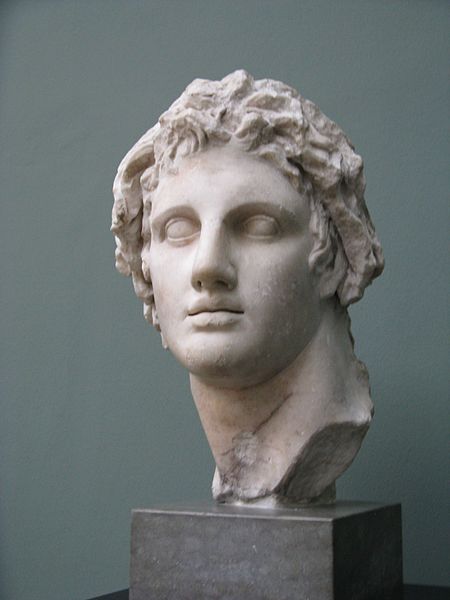 Позднеэллинистический роман об Александре Македонском был переведен на множество языков мира. Среди документов, найденных при раскопках в Турфанском оазисе обнаружилась и монгольская версия 14 века. Книга сохранилась фрагментарно.
Александр Македонский именуется здесь Сулкарнай.
Позднеэллинистический роман об Александре Македонском был переведен на множество языков мира. Среди документов, найденных при раскопках в Турфанском оазисе обнаружилась и монгольская версия 14 века. Книга сохранилась фрагментарно.
Александр Македонский именуется здесь Сулкарнай. 